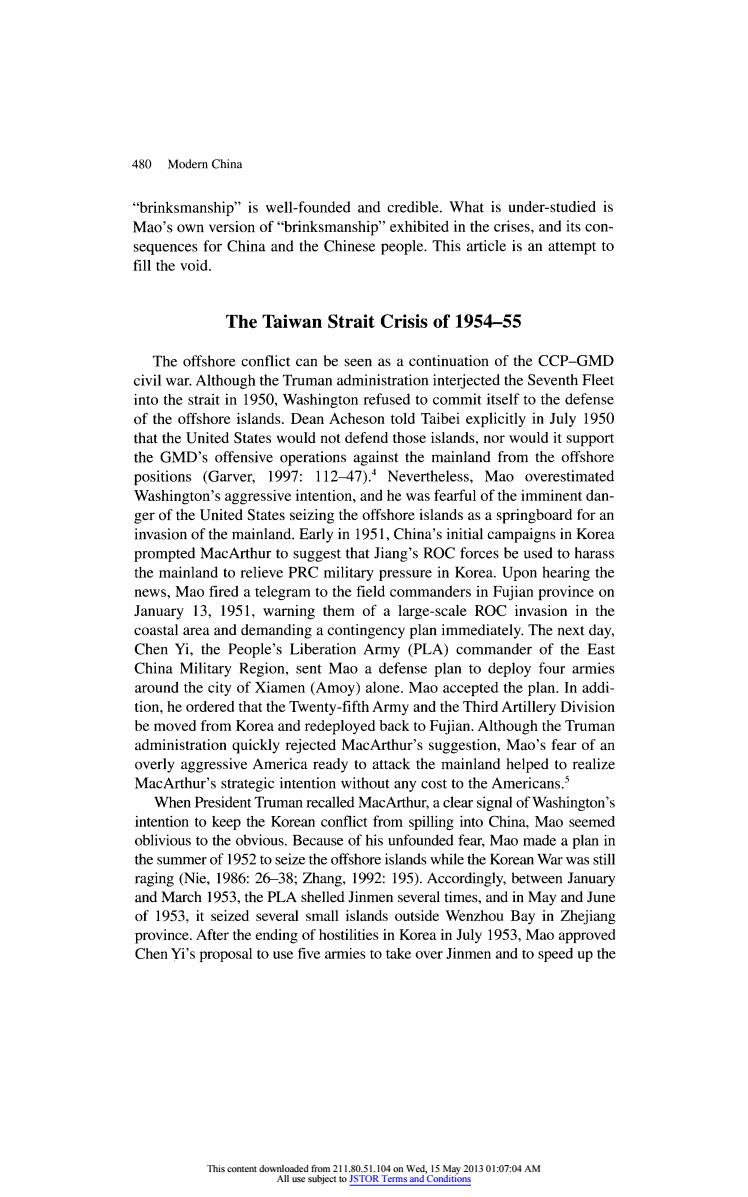正在加载图片...

480 Modern China "brinksmanship"is well-founded and credible.What is under-studied is Mao's own version of"brinksmanship"exhibited in the crises,and its con- sequences for China and the Chinese people.This article is an attempt to fill the void. The Taiwan Strait Crisis of 1954-55 The offshore conflict can be seen as a continuation of the CCP-GMD civil war.Although the Truman administration interjected the Seventh Fleet into the strait in 1950,Washington refused to commit itself to the defense of the offshore islands.Dean Acheson told Taibei explicitly in July 1950 that the United States would not defend those islands,nor would it support the GMD's offensive operations against the mainland from the offshore positions (Garver,1997:112-47).Nevertheless,Mao overestimated Washington's aggressive intention,and he was fearful of the imminent dan- ger of the United States seizing the offshore islands as a springboard for an invasion of the mainland.Early in 1951,China's initial campaigns in Korea prompted MacArthur to suggest that Jiang's ROC forces be used to harass the mainland to relieve PRC military pressure in Korea.Upon hearing the news,Mao fired a telegram to the field commanders in Fujian province on January 13,1951,warning them of a large-scale ROC invasion in the coastal area and demanding a contingency plan immediately.The next day, Chen Yi,the People's Liberation Army (PLA)commander of the East China Military Region,sent Mao a defense plan to deploy four armies around the city of Xiamen(Amoy)alone.Mao accepted the plan.In addi- tion,he ordered that the Twenty-fifth Army and the Third Artillery Division be moved from Korea and redeployed back to Fujian.Although the Truman administration quickly rejected MacArthur's suggestion,Mao's fear of an overly aggressive America ready to attack the mainland helped to realize MacArthur's strategic intention without any cost to the Americans.5 When President Truman recalled MacArthur,a clear signal of Washington's intention to keep the Korean conflict from spilling into China.Mao seemed oblivious to the obvious.Because of his unfounded fear,Mao made a plan in the summer of 1952 to seize the offshore islands while the Korean War was still raging (Nie,1986:26-38;Zhang,1992:195).Accordingly,between January and March 1953,the PLA shelled Jinmen several times,and in May and June of 1953,it seized several small islands outside Wenzhou Bay in Zhejiang province.After the ending of hostilities in Korea in July 1953,Mao approved Chen Yi's proposal to use five armies to take over Jinmen and to speed up the This content downloaded from 211.80.51.104 on Wed,15 May 2013 01:07:04 AM All use subject to JSTOR Terms and Conditions480 Modern China "brinksmanship" is well-founded and credible. What is under-studied is Mao's own version of "brinksmanship" exhibited in the crises, and its con sequences for China and the Chinese people. This article is an attempt to fill the void. The Taiwan Strait Crisis of 1954-55 The offshore conflict can be seen as a continuation of the CCP-GMD civil war. Although the Truman administration interjected the Seventh Fleet into the strait in 1950, Washington refused to commit itself to the defense of the offshore islands. Dean Acheson told Taibei explicitly in July 1950 that the United States would not defend those islands, nor would it support the GMD's offensive operations against the mainland from the offshore positions (Garver, 1997: 112-41).4 Nevertheless, Mao overestimated Washington's aggressive intention, and he was fearful of the imminent dan ger of the United States seizing the offshore islands as a springboard for an invasion of the mainland. Early in 1951, China's initial campaigns in Korea prompted Mac Arthur to suggest that Jiang's ROC forces be used to harass the mainland to relieve PRC military pressure in Korea. Upon hearing the news, Mao fired a telegram to the field commanders in Fujian province on January 13, 1951, warning them of a large-scale ROC invasion in the coastal area and demanding a contingency plan immediately. The next day, Chen Yi, the People's Liberation Army (PLA) commander of the East China Military Region, sent Mao a defense plan to deploy four armies around the city of Xiamen (Amoy) alone. Mao accepted the plan. In addi tion, he ordered that the Twenty-fifth Army and the Third Artillery Division be moved from Korea and redeployed back to Fujian. Although the Truman administration quickly rejected MacArthur's suggestion, Mao's fear of an overly aggressive America ready to attack the mainland helped to realize MacArthur's strategic intention without any cost to the Americans.5 When President Truman recalled Mac Arthur, a clear signal of Washington's intention to keep the Korean conflict from spilling into China, Mao seemed oblivious to the obvious. Because of his unfounded fear, Mao made a plan in the summer of 1952 to seize the offshore islands while the Korean War was still raging (Nie, 1986: 26-38; Zhang, 1992: 195). Accordingly, between January and March 1953, the PL A shelled Jinmen several times, and in May and June of 1953, it seized several small islands outside Wenzhou Bay in Zhejiang province. After the ending of hostilities in Korea in July 1953, Mao approved Chen Yi's proposal to use five armies to take over Jinmen and to speed up the This content downloaded from 211.80.51.104 on Wed, 15 May 2013 01:07:04 AM All use subject to JSTOR Terms and Conditions